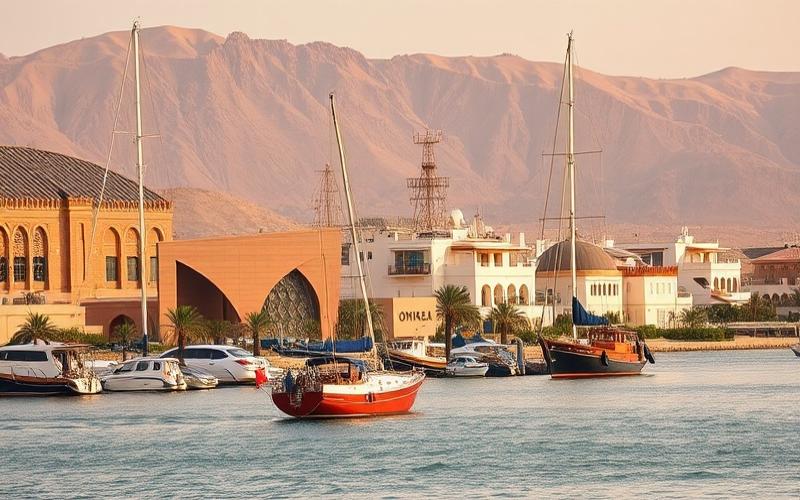
 Published on and written by Cyril Jarnias
Published on and written by Cyril Jarnias
Oman, the Middle East’s hidden gem, is emerging as a prime destination for international entrepreneurs and investors seeking opportunities. With its rapidly growing economy, political stability, and business-friendly regulatory framework, the sultanate offers fertile ground for business creation. In this article, we will explore in detail the benefits and key steps to establish your company in Oman in 2025.


Oman, a Middle Eastern country experiencing economic growth, offers numerous opportunities for entrepreneurs and innovators. However, to fully leverage these [...]


Oman, a Middle Eastern country located on the southeastern coast of the Arabian Peninsula, offers numerous opportunities for foreign investors. [...]


Oman, an emerging destination for international investors, offers an attractive tax environment for businesses. This article explores in detail the [...]


Oman, a Middle Eastern country located on the Arabian Peninsula, offers an expanding labor market that attracts numerous foreign investors [...]


Opening a corporate bank account is a crucial step for any company looking to establish itself in Oman. This process, [...]


Oman, a Gulf country experiencing economic growth, offers numerous opportunities for businesses looking to establish or expand their operations there. [...]


Oman’s economy is currently undergoing a phase of diversification and modernization that opens new prospects for entrepreneurs. Long dependent on [...]


Oman offers an attractive business environment for foreign entrepreneurs looking to establish themselves in the Gulf region. However, choosing the [...]


Oman, the jewel of the Middle East, is attracting an increasing number of foreign entrepreneurs thanks to its favorable business [...]


Omani corporate culture presents a fascinating blend of ancient traditions and modernity, reflecting the rapid evolution of this Gulf nation. [...]


Entrepreneurship in Oman offers excellent opportunities but requires careful preparation to avoid pitfalls. Here is a comprehensive guide to common [...]


Oman, with its rapidly growing economy and flourishing business opportunities, is attracting more and more entrepreneurs eager to establish their [...]


Understanding the consumer market in Oman is essential for any business looking to establish or expand in this Gulf country. [...]


The Sultanate of Oman, strategically nestled in the eastern Arabian Peninsula, is positioning itself as an increasingly attractive destination for [...]


Oman, a Middle Eastern country located on the southeastern coast of the Arabian Peninsula, is attracting more and more foreign [...]


Oman, a Middle Eastern country undergoing economic transformation, is increasingly attracting attention from entrepreneurs worldwide. With its strategic geographical position, [...]


Oman’s e-commerce sector is experiencing explosive growth, radically transforming the country’s commercial landscape. This rapid evolution is creating new opportunities [...]
Oman: A Promised Land for Visionary Entrepreneurs
Establishing a company in Oman in 2025 offers numerous strategic advantages for ambitious entrepreneurs. The country benefits from a privileged geographical position, at the crossroads of the Middle East, Africa, and Asia, providing direct access to rapidly expanding markets.
The Omani economy is experiencing sustained growth, driven by massive investments in infrastructure and economic diversification. The government has implemented attractive policies to draw foreign investment, particularly in key sectors like technology, renewable energy, and tourism.
Oman’s political and social stability is a major asset in a sometimes unstable region. The country enjoys a reputation for neutrality and diplomacy, making it a safe haven for business.
Additionally, Oman offers a transparent and business-friendly regulatory framework for foreign companies. Administrative procedures have been simplified, and company formation can be completed quickly. The country also boasts modern infrastructure, particularly in special economic zones, facilitating business establishment and development.
Good to Know:
Oman regularly ranks among the most attractive Middle Eastern countries for foreign investors, thanks to its stability, economic openness, and quality infrastructure.
The Most Suitable Legal Structures for Your Project in Oman
Choosing the legal structure is a crucial step when establishing your company in Oman. Here are the main options available to you:
1. Limited Liability Company (LLC) This is the most popular legal form for foreign investors. It offers limited liability to partners and can be 100% foreign-owned in certain sectors. The required minimum capital is relatively low.
2. Sole Proprietorship This structure is reserved for Omani nationals and Gulf Cooperation Council (GCC) country citizens. It is suitable for small businesses and individual entrepreneurs.
3. Joint Stock Company (SAOC or SAOG) Equivalent to a corporation, it is suitable for large projects and can be closed (SAOC) or publicly traded (SAOG). It requires more significant capital and is subject to stricter regulations.
4. Branch Office Foreign companies can establish a branch in Oman to conduct specific activities, particularly for government contracts.
5. Representative Office This structure allows foreign companies to have a local presence for promotional and liaison activities, without engaging in direct commercial activities.
The choice of structure will depend on your business sector, objectives, and market entry strategy. It is highly recommended to consult with a local legal expert to guide you in this crucial decision.
Good to Know:
The LLC is generally the most advantageous structure for foreign investors, offering a good balance between flexibility, legal protection, and ease of management.
Omani Taxation: A Major Asset for Your Business
The Omani tax system is one of the most attractive in the region, offering numerous benefits to local and foreign businesses. Here are the main points to remember:
Corporate Tax: The standard rate is 15% on profits, one of the lowest in the region. Companies with revenue below 100,000 Omani Rials (approximately $260,000) are exempt.
No Personal Income Tax: Employees, whether Omani or expatriates, are not subject to income tax.
Tax Exemptions: Temporary corporate tax exemptions may be granted to companies operating in priority sectors or in certain special economic zones, for up to 10 years.
No Value Added Tax (VAT): Unlike other Gulf countries, Oman has not yet introduced VAT, although its implementation is being considered for the future.
Advantageous Tax Treaties: Oman has signed numerous double taxation avoidance agreements, facilitating international trade and optimizing taxation for companies operating internationally.
Sector-Specific Tax Incentives: Certain strategic sectors, such as renewable energy, technology, or tourism, may benefit from additional tax advantages.
This attractive tax system allows companies to maximize their profits and reinvest in their growth. However, it is crucial to stay informed about tax developments and ensure compliant tax management by engaging local accounting experts.
Good to Know:
Companies operating in Oman’s free zones can benefit from a total corporate tax exemption for up to 25 years, renewable.
Establishing Your Company in Oman: A Simplified Process in 5 Key Steps
Company formation in Oman has been significantly simplified in recent years, thanks to the implementation of one-stop shops and online procedures. Here are the main steps to follow:
1. Choose and Reserve Your Company Name – Check name availability with the Ministry of Commerce and Industry. – Ensure the name complies with local rules (no offensive terms, no personal names except with special authorization).
2. Prepare Incorporation Documents – Draft the company’s articles of association with the help of a local lawyer. – Gather identity documents of partners and proof of capital.
3. Obtain Necessary Approvals – Submit your application to the Ministry of Commerce and Industry. – Obtain specific licenses for your activity from the competent authorities.
4. Register with the Commercial Registry – Once approvals are obtained, register your company with the commercial registry. – Pay registration fees and obtain your certificate of incorporation.
5. Finalize Post-Incorporation Procedures – Register with the tax authorities to obtain your tax identification number. – Open a professional bank account. – Register with the Omani social security if you plan to hire staff.
The average time to establish a company in Oman is approximately 2 to 4 weeks, depending on the complexity of your project and required approvals. It is highly recommended to engage a local law firm to guide you through these procedures and ensure their compliance.
Good to Know:
The Omani government has established an online portal “Invest Easy” that centralizes many administrative procedures, significantly simplifying the business creation process.
Oman vs Other Offshore Jurisdictions: An Enlightening Comparison
Oman positions itself as an attractive alternative compared to other popular offshore jurisdictions. Here is a comparison with some competing destinations:
Oman vs Dubai (UAE) – Oman Advantage: Lower operational costs, less market saturation. – Dubai Advantage: More developed infrastructure, more mature business ecosystem.
Oman vs Bahrain – Oman Advantage: Superior political stability, larger domestic market. – Bahrain Advantage: More developed financial sector, more flexible regulation in certain areas.
Oman vs Singapore – Oman Advantage: More advantageous taxation, lower cost of living. – Singapore Advantage: Cutting-edge technological ecosystem, privileged access to Asian markets.
Oman vs Mauritius – Oman Advantage: Proximity to Middle Eastern and Asian markets, more modern infrastructure. – Mauritius Advantage: Simpler administrative procedures, more advantageous offshore tax regime for certain structures.
Oman stands out for its stability, strategic geographical position, and largely untapped growth potential. The country offers an interesting balance between tax advantages, quality of life, and development opportunities, particularly for businesses targeting Middle Eastern, African, and South Asian markets.
Good to Know:
Unlike some offshore jurisdictions, Oman is not considered a tax haven by major international organizations, which can facilitate international commercial and banking relationships.
Social Obligations in Oman: A Protective Framework for Employers and Employees
Omani labor law aims to protect both employer and employee interests, while remaining flexible to attract investment. Here are the main points to know:
Employment Contracts – Contracts must be written in Arabic (with English translation if necessary). – Probation period cannot exceed 3 months.
Working Hours – Maximum 48 hours per week, with at least one weekly rest day. – Overtime paid at 25% to 100% premium depending on circumstances.
Leave – 30 days of paid annual leave after one year of service. – Sick leave, maternity leave, and other special leaves provided by law.
Social Security – Employers must contribute to Omani social security for Omani employees (11.5% of salary contribution). – For expatriates, employers must provide private health insurance.
Omanization – Employment quotas for Omani citizens are imposed in certain sectors, ranging from 15% to 100%. – Incentives are offered to companies exceeding their Omanization targets.
End of Contract – Minimum one-month notice (except for serious misconduct). – End-of-service benefits for indefinite-term contracts.
It is crucial to understand these obligations and implement compliant HR management. Many companies engage specialized firms to manage these aspects and ensure compliance with local legislation.
Good to Know:
The Omani government actively encourages training and employment of young Omanis. Companies investing in local workforce training can benefit from tax incentives and subsidies.
Opening a Professional Bank Account in Oman: Key Steps
Opening a professional bank account is a crucial step to operate effectively in Oman. Here is the procedure to follow:
1. Choose the Right Bank – Compare offers from major Omani and international banks present in the country. – Consider fees, online services, branch network, and expertise in your business sector.
2. Prepare Required Documents – Company registration certificate – Company articles of association – Commercial licenses – Passports and visas of authorized signatories – Company address proof – Business plan (sometimes required for new businesses)
3. Submit Your Application – Schedule an appointment with a bank advisor. – Submit your complete file and fill out required forms.
4. Verification and Approval – The bank will conduct compliance checks (KYC – Know Your Customer). – Approval time can vary from a few days to several weeks.
5. Account Activation – Once approved, make the required initial minimum deposit. – Collect your online banking credentials and payment methods.
Important Points to Note: – Some banks may require high minimum deposits for foreign company accounts. – Compliance procedures are generally stricter for foreign companies, so plan for longer processing times. – It is often easier to open an account if you have a local partner or Omani sponsor.
It is recommended to engage a local intermediary (lawyer or consultant) to facilitate the process, especially if you don’t have a physical presence in Oman at the time of account opening.
Good to Know:
Some Omani banks offer “offshore banking” services allowing accounts to be opened in foreign currencies, which can be advantageous for companies with international activities.
Future Sectors in Oman: Where to Invest in 2025?
Oman has committed to an ambitious economic diversification strategy, opening numerous opportunities for investors. Here are the most promising sectors for 2025 and beyond:
1. Renewable Energy Oman aims to produce 30% of its electricity from renewable sources by 2030. Solar and wind projects are multiplying, offering excellent prospects for companies in the sector.
2. Tourism and Hospitality The country is betting on high-end and sustainable tourism. Massive investments are planned in hotel infrastructure and tourist attractions.
3. Information Technology Oman aspires to become a regional technology hub. Opportunities are numerous in cloud computing, artificial intelligence, and cybersecurity.
4. Logistics and Transportation Thanks to its strategic position, Oman is developing its port and airport infrastructure. The logistics sector offers strong growth potential.
5. Manufacturing Industry The government encourages the establishment of high-value-added industries, particularly in automotive, aerospace, and pharmaceutical sectors.
6. Aquaculture and Fishing Oman is investing heavily in aquaculture development to diversify its economy and ensure food security.
7. Healthcare and Biotechnology The country seeks to develop its healthcare sector, with opportunities in specialized medical services and biomedical research.
8. Circular Economy and Waste Management Oman emphasizes sustainable development, creating opportunities in recycling and waste valorization.
These sectors often benefit from specific incentives, such as extended tax exemptions or investment subsidies. It is crucial to stay informed about the latest sectoral policies to identify the best opportunities.
Good to Know:
Oman has created several special economic zones, like Duqm, offering additional advantages to investors in these priority sectors, including extended tax exemptions and simplified administrative procedures.
Recruiting in Oman: Keys to Building a High-Performing Team
Recruitment in Oman presents specificities that are important to master to build an effective team compliant with local regulations. Here are the essential points to know:
1. Understand Omanization Policy – Familiarize yourself with employment quotas for Omani citizens in your sector. – Explore government training and subsidy programs for Omani employment.
2. Diversify Your Recruitment Channels – Use local job sites like Bayt.com or GulfTalent. – Engage recruitment agencies specialized in the Omani market. – Leverage professional social networks, particularly popular among young Omani graduates.
3. Master Visa Procedures – For expatriates, obtain work authorization from the Ministry of Labor. – Allow sufficient time for visa procedures, which can take several weeks.
4. Adapt Your Selection Process – Consider cultural differences in conducting interviews. – Carefully verify qualifications, as some foreign degrees may require local equivalency.
5. Offer Attractive Packages – Offer competitive salaries, in line with Omani market standards. – Include locally appreciated benefits like family health insurance or housing allowances.
6. Invest in Training – Develop training programs for Omani employees, which is often viewed favorably by authorities. – Consider partnerships with local universities for internship or apprenticeship programs.
7. Create an Inclusive Company Culture – Promote integration between local and expatriate employees. – Respect local traditions and cultural practices, especially during Ramadan.
Recruitment in Oman requires a balanced approach, combining respect for legal Omanization obligations with the search for the best skills, whether local or international. Many companies choose to collaborate with specialized HR firms to effectively navigate this complex process.
Good to Know:
The Omani government has established vocational training centers in various sectors. Collaborating with these centers can be an excellent way to recruit qualified local talent and meet your Omanization objectives.
Conclusion: Oman, A Land of Opportunities for Visionary Entrepreneurs
Establishing a company in Oman in 2025 represents an exceptional opportunity for entrepreneurs and investors seeking new horizons. With its political stability, rapidly growing economy, and business-friendly regulatory framework, Oman offers fertile ground for developing innovative and ambitious projects.
The advantages are numerous: attractive taxation, simplified business creation procedures, booming future sectors, and strategic geographical positioning. Additionally, the Omani government demonstrates strong commitment to attracting and supporting foreign investment, particularly through sector-specific incentives and the creation of special economic zones.
However, succeeding in Oman requires meticulous preparation and deep understanding of the local market. It is crucial to choose the right legal structure, master tax and social obligations, and develop a recruitment strategy adapted to the country’s specificities.
To maximize your chances of success, it is highly recommended to surround yourself with local experts – lawyers, accountants, human resources consultants – who can guide you through the subtleties of the Omani market and help you avoid potential pitfalls.
Oman positions itself as an attractive alternative to more traditional offshore destinations, offering a unique balance between modernity and traditions, stability and economic dynamism. For visionary entrepreneurs capable of seizing these opportunities, Oman could well be the key to successful international development in the coming years.
Good to Know:
The Omani government recently launched a long-term visa program for investors and entrepreneurs, further facilitating the establishment and development of activities in the country.
Disclaimer: The information provided on this website is for informational purposes only and does not constitute financial, legal, or professional advice. We encourage you to consult qualified experts before making any investment, real estate, or expatriation decisions. Although we strive to maintain up-to-date and accurate information, we do not guarantee the completeness, accuracy, or timeliness of the proposed content. As investment and expatriation involve risks, we disclaim any liability for potential losses or damages arising from the use of this site. Your use of this site confirms your acceptance of these terms and your understanding of the associated risks.



